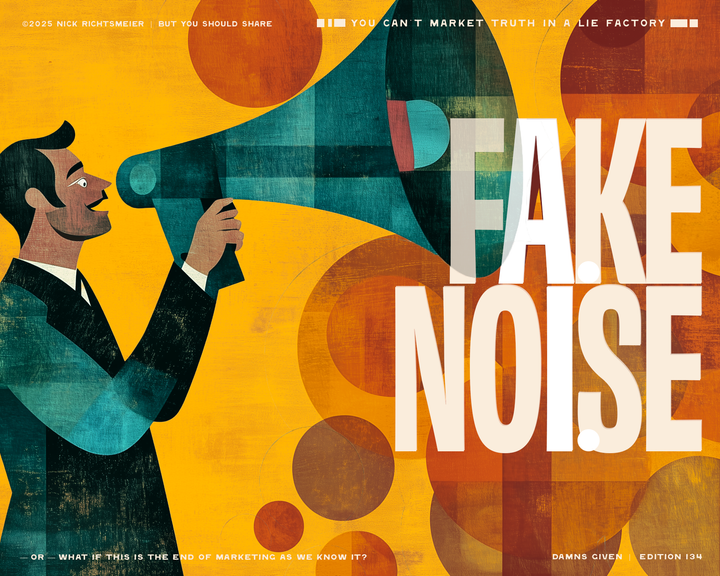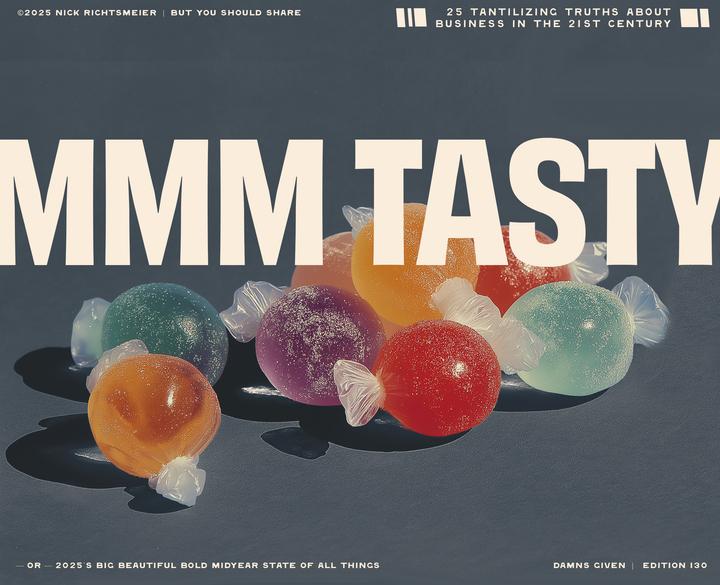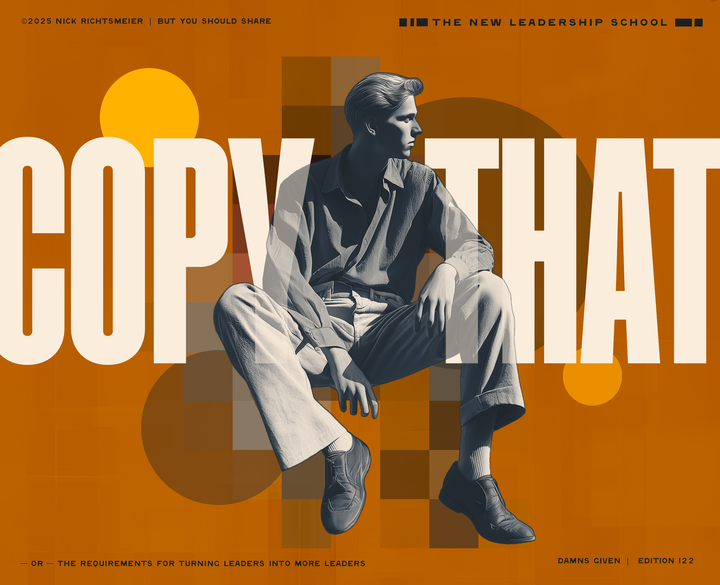Who will they trust? Maybe you.
The future of every industry is defined on the bookends: Boomers who aren't leaving, and Gen-Z/late Millennials who own the culture. All the money is flowing sub-40 to a group of people with such Rizz that they don't trust the internet, brands, or the media. Who will they trust? Maybe you.
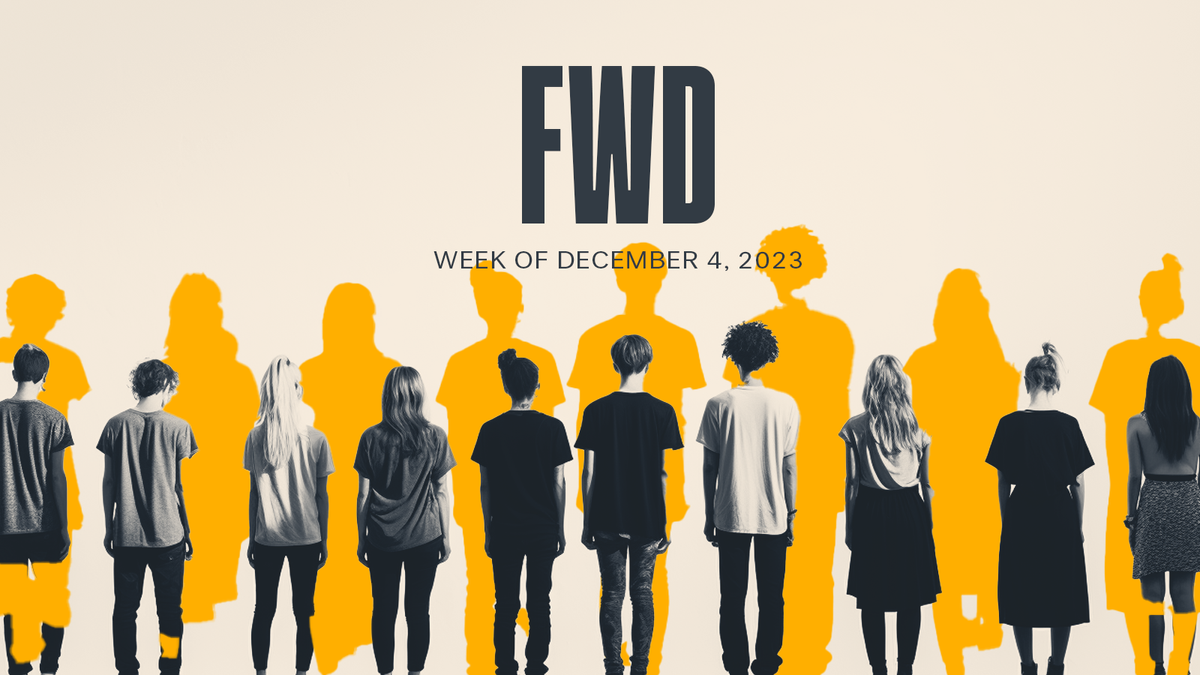
FWD Edition 91
Welcome to the first "edition" of Forward on our new digital platform: CultureCraft | Editions. I've been waiting for this day for quite some time, and it's finally here!
What's here, you ask? Don't worry, I'll tell you. Our new all-in-one platform of thought leadership. Now you can customize your subscriptions to our particular newsletter topics, and we're able to provide additional resources to subscribers that no one else gets. And you have easy, searchable access to past Editions after they've been released.
You can update your subscription to include:
FWD: Weekly commentary from the business and cultural landscape that impacts businesses like yours who live by trust.
MADE: Marketing and creative insight on how to position and grow your brand (1-2x per month)
CAPITAL IDEA: Contrarian thinking for shifting the conversation in the business of wealth. (1-2x per month)
More Editions from more contributors are on their way. We're building a platform for people to think about trust in key areas in new ways. If you think you are one of those people, let's talk.
And now, let's get into this week's damns to give, there's a lot at stake, so let's get moving:

YES...to RIZZ.
I'm a parent of Gen Z boys. (And apparently a Gen Alpha, but I'm not ready to accept that naming convention.) And so I am well-versed in how to walk in the room drippy and full of rizz. No cap, your friends will be like "Bet, bruh. Take the W." And I will, even though I was sure today was giving L.
(Translations available for a nominal fee.)
So I was thrilled to see that Oxford's word of the year is Rizz. Less subtle students of the youths will tell you that Rizz is just an abbreviation for charisma, but it's so much more.
It's charm. It's good looks but not too good. It's an absence of try-hard energy. And while you may never use "Rizz" in your corporate strategic plan, it tells you everything you need to know about your next generation of consumers:
They want to be seen, to compete, to be recognized, and to stand apart. They're not Millennial-lite. They are their own thing with a Rizz all their own. More on these makers of the now in this week's "NOW" below.
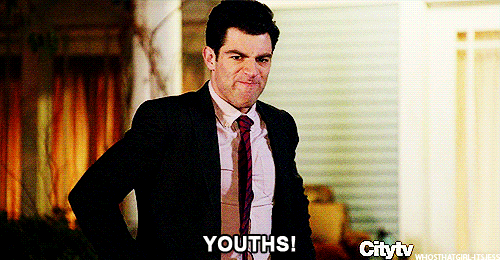

No...to subtlety.
Earlier this year, I was meeting with a marketing leader in the non-profit sector. He had some challenges across the board with staffing and hitting goals, so I gave him some free advice.
"No one knows what you're for," I said. I could have said, "You've got no rizz, but he wasn't ready for that.) He looked flabbergasted as he rattled off the stated mission of his organization and the apparent work they did in their space.
"But your space is broken," I continued. "Everyone believes that. And the fact that you don't make clear that you know it's broken and what you're doing about it... the silence is deafening. It leads us all to believe that you're part of the problem."
He pivoted to his most recent newsletter and highlighted a story that showed how they were making a real impact. "See? That's how we're different."
"No one read that story. And if they did, they didn't take away some subtle nuance about how you're doing marginally better work than other groups like you."
I've had three more conversations almost exactly like this in the last month in three other industries. Businesses and ventures that have been trusted for years take that trust for granted. They assume that everyone knows what happens on the inside. They attempt to win on subtle points and good intentions, all the while postponing their decline.
"If you knew us, you'd love us." is the most poisonous phrase in marketing. If I have to know you personally to love you, then someone's not doing their job.

Maybe...ChatGPT needs a leash.
ChatGPT and the other LLMs will be the defining influence in the success or failure of trust in business for the next decade. And so we're back here again... with a little bit of good news.
After last month's Sam Altman chaos, you probably need a breather from Generative AI headlines, but you won't get one. Sad characters on LinkedIn (is that redundant?) were ushing Dall-E to create AI images of a birthday cake to wish Dall-E's digital brother Chat GPT a Happy 1st Birthday and then screenshotting it like some Instagram hellscape.
Not my idea of a good time.
My idea of fun? The news that Vox Media, gateway of internet fanboys, has added itself to the growing list of major sites blocking ChatGPT from scraping its site to train their AI. As one Verge team member said it, "We've had quite enough of them making money off our work for free."
Power players have used the Trojan Horse of the "open internet" to grift off other people's efforts since the days of AOL and dial-up modems. Maybe folks are catching on that tech-powered theft isn't great.

Seriously... free shrimp?
Excess of all the wrong things may be the story of the 2020s, and this piece de resistance seals the deal. Red Lobster announced an $11M loss was triggered by making their Endless Shrimp deal go year-round. Besides the fact that $11M worth of wholesale shrimp is an ungodly amount of less-than-fresh seafood, this is a cautionary tale on cut-rate pricing (a trust-breaking strategy in nearly all industries).
The race to the bottom sinks everybody. (Gratuitous nautical metaphor...) And while inflation has made the news, you won't win by being cheap.
Price is a branding strategy. Period.
This $11M bucket of crustaceans is a cautionary tale to financial advisors who spent most of 2022 cutting fees to apologize for markets that were out of their control.
I'll say it again: price is a branding strategy. It's a critical piece of telling people who you are. If you're JCPenney you can't live with it, and you can't live without it.
Look in the mirror. Is your business JCPenney?


Now... get everything out of the way of value.
2024 will have no space for nuanced wins or cheap gimmicks. I can promise you that. The economy is improving in health, but it's also an unforgiving slog out there for businesses trying to grow. The old tricks don't work when there's no free money.
So here's what you're going to do, pick one of these priorities for 2024 and really do it:
- Laser-focused value creation: what do you make or do that puts the rest of your industry to shame? (The answer is not "customer service" or "financial planning") If it's a degree of difference better than others, you can't win on it. Once you know it, message the hell out of it so everyone else knows it, too.
- High-powered POV: What uncompromising perspective do you have that if you said it outloud at the industry conferences 80% of the room would hate you, but you know you're right because it's good for your clients? Find that voice. Package it. Use it. Ship it. And make the case for your category of one.
- G2 is too late: What can you build next year so that every Boomer is mentoring a Millennial and every Gen-X is mentoring an Gen-Z and every Millennial is volunteering to mentor teens? Build an operating system (not just a culture) for development and growth. Make investing in others a requirement for compensation. And deploy all that experienced talent to build YOUNG.
The future of every industry is defined on the bookends: Boomers who aren't leaving, and Gen-Z/late Millennials who own the culture. All the money is flowing sub-40 to a group of people with such Rizz that they don't trust the internet, brands, or the media.
Who will they trust? Maybe you. Let's get to work.

